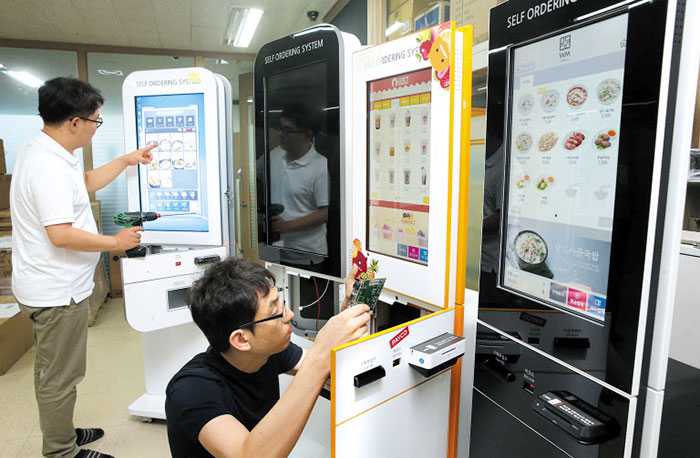Minimum Wage Hike Drives up Demand for Self-Service Kiosks
22 July, 2018

Self-service kiosks are mushrooming in stores around the country as businesses take fright at the minimum wage hike.
Burger King, the epitome of a dead-end minimum wage employer, already operates self-service kiosks at 67 percent of its 313 stores across Korea and now plans to install them at all of them. Lotteria, which operates the kiosks at 56 percent of its 1,350 outlets, also plans to expand them.
The machines have been slower to catch on in Korea than in neighboring Japan because consumers are not used to pre-paying for products.
"In Japan, where consumers are quite used to pre-paying, 10 to 15 percent of restaurants have these kiosks," an industry insider said. "But the rate is only one to two percent in Korea."
Fresh-juice franchise Juicy began installing self-service kiosks throughout its stores late last year. "We analyzed operating costs over the last six months and found that one kiosk can replace 1.5 workers," a staffer said. "That translates into W3 million in cost savings a month per outlet" (US$1=W1,138).
Staff work on self-service kiosks at a manufacturer in Seoul on Wednesday.
To make it easier, a growing number of manufacturers are renting out kiosks for W80,000 to W300,000 a month. All they need to do is to provide photos of their dishes and drinks and the manufacturer customizes menu screens.
Machines are also replacing baristas in cheap coffee shops. In one recently opened coffee shop in Gangnam, robots brew coffee and serve it. Thanks to the labor costs saved, a cup of Americano costs just W2,000 and a latte W2,500.
Convenience stores and supermarkets are also setting up self-checkout machines. E-Mart operates self-checkouts at 40 of its 144 stores around the country. Lotte Mart, which operates them at 10 stores, plans to set them up in 40 this year.
Baskin-Robbins began using what it calls "ice cream ATMs" in five of its outlets in Seoul. A staffer at SPC, which runs the chain here, said, "The machines enable shorter ordering times during peak hours and allow additional revenues to be generated even after stores close at night."
The buffet restaurant chain Ashley Classic is expanding self-service operations, with 13 of its 36 outlets now self-serviced. Customers set their own tables and clear up after themselves.
One retail industry insider said, "Restaurant owners are looking for alternatives to hiring expensive part-time staff. We will see the number of jobs decline due to the minimum wage hike."
